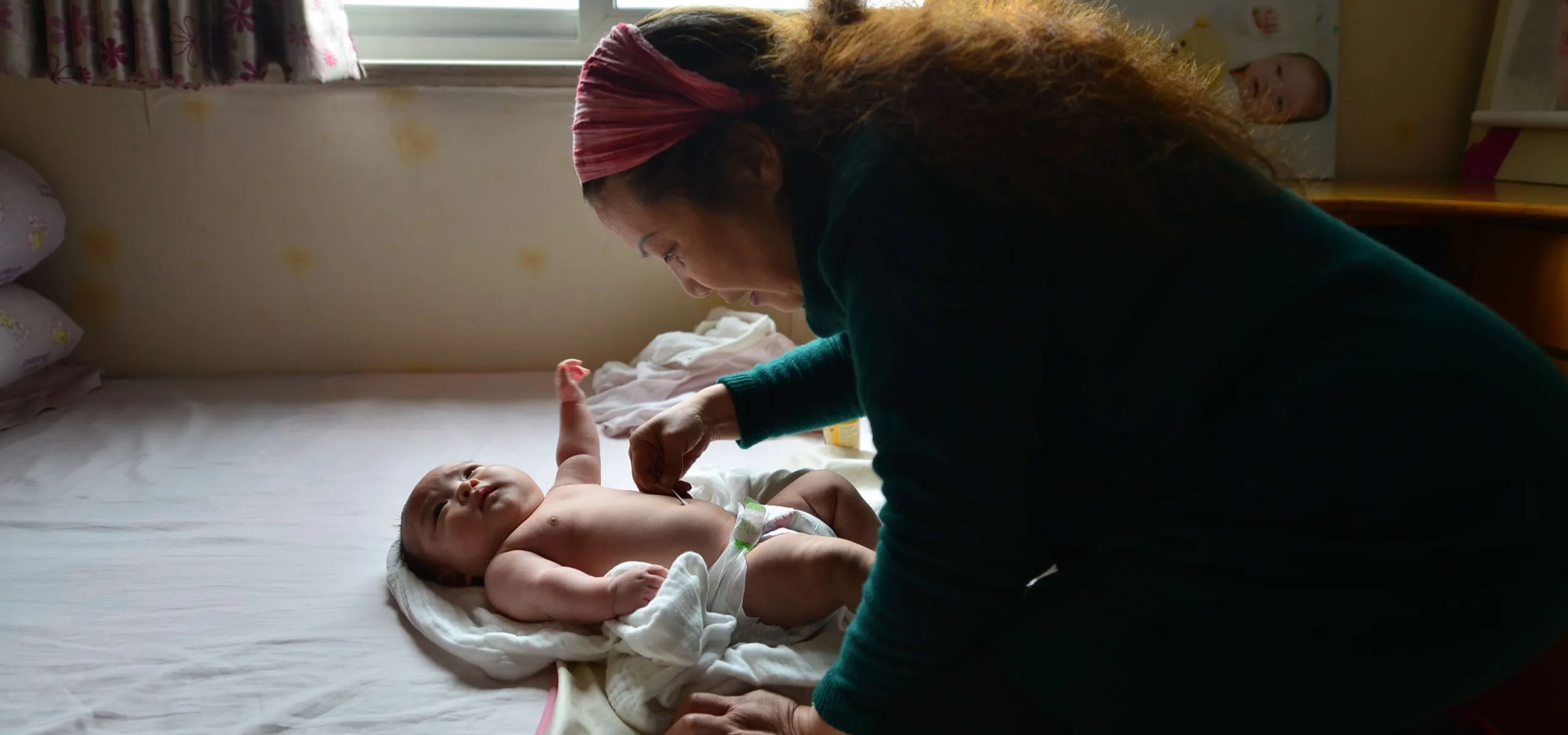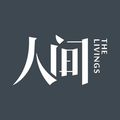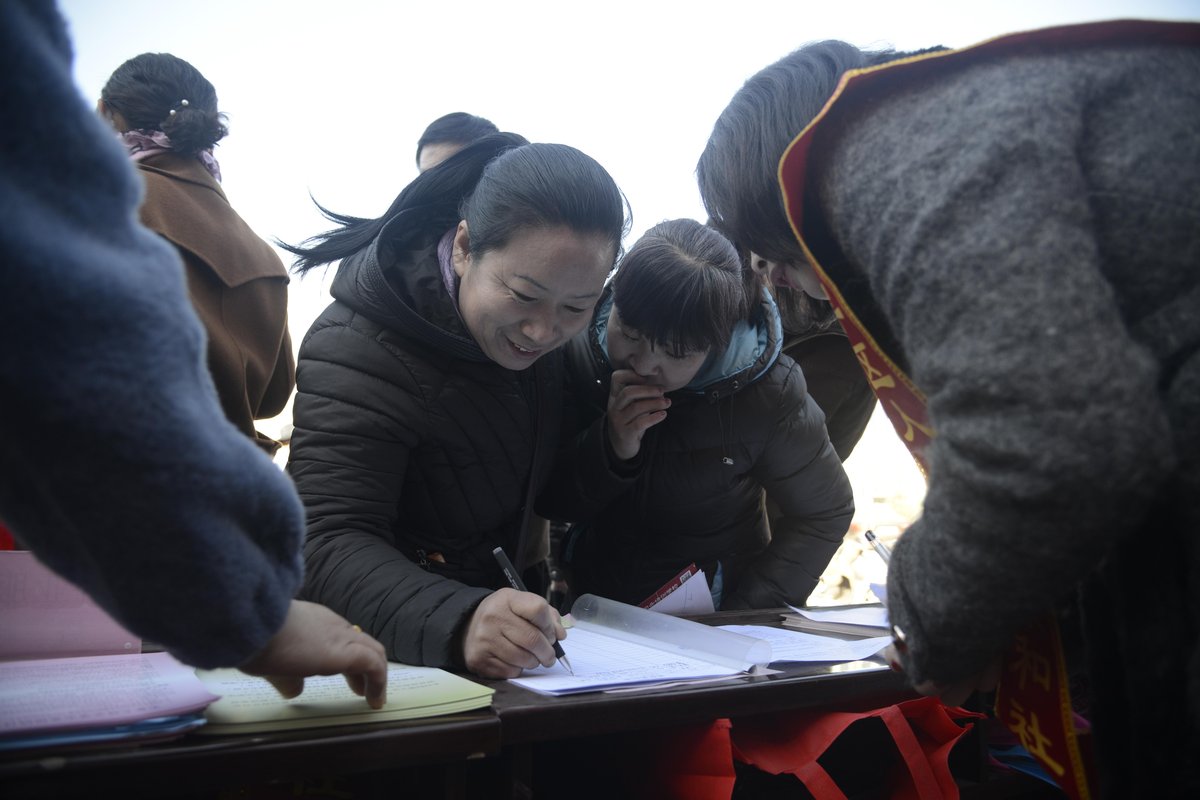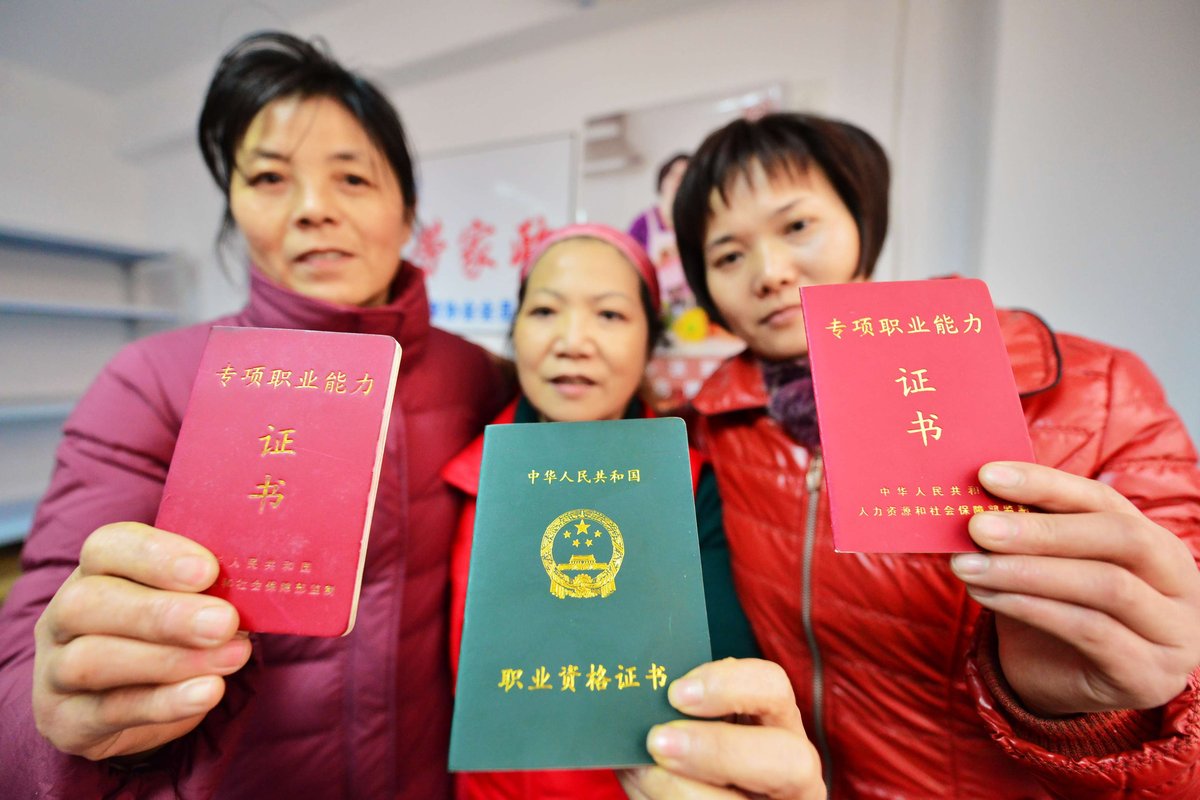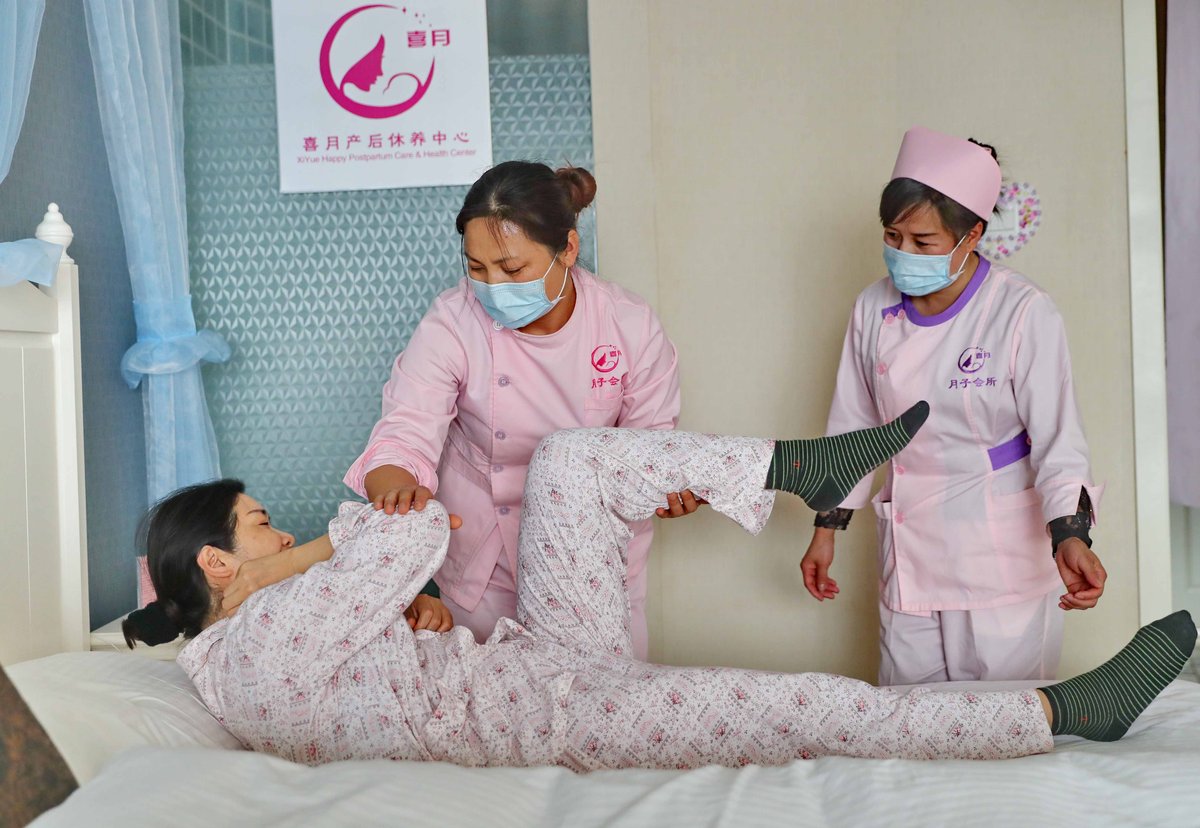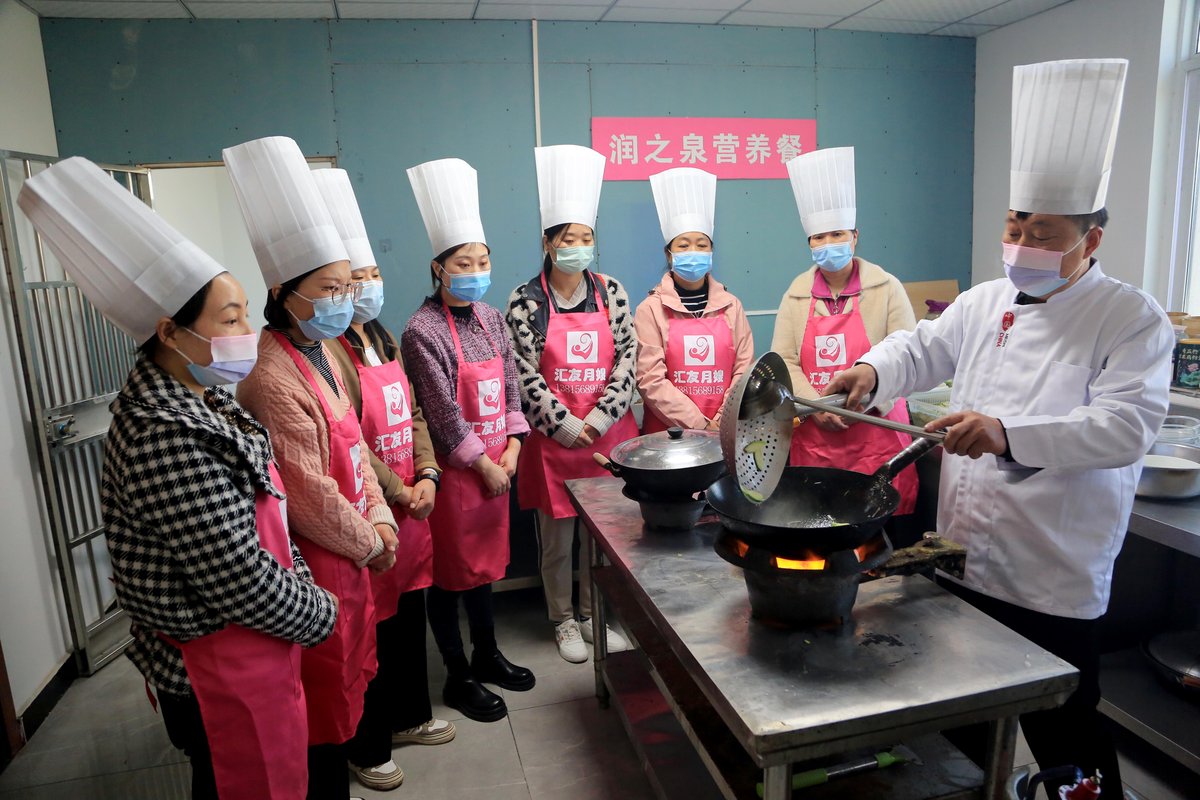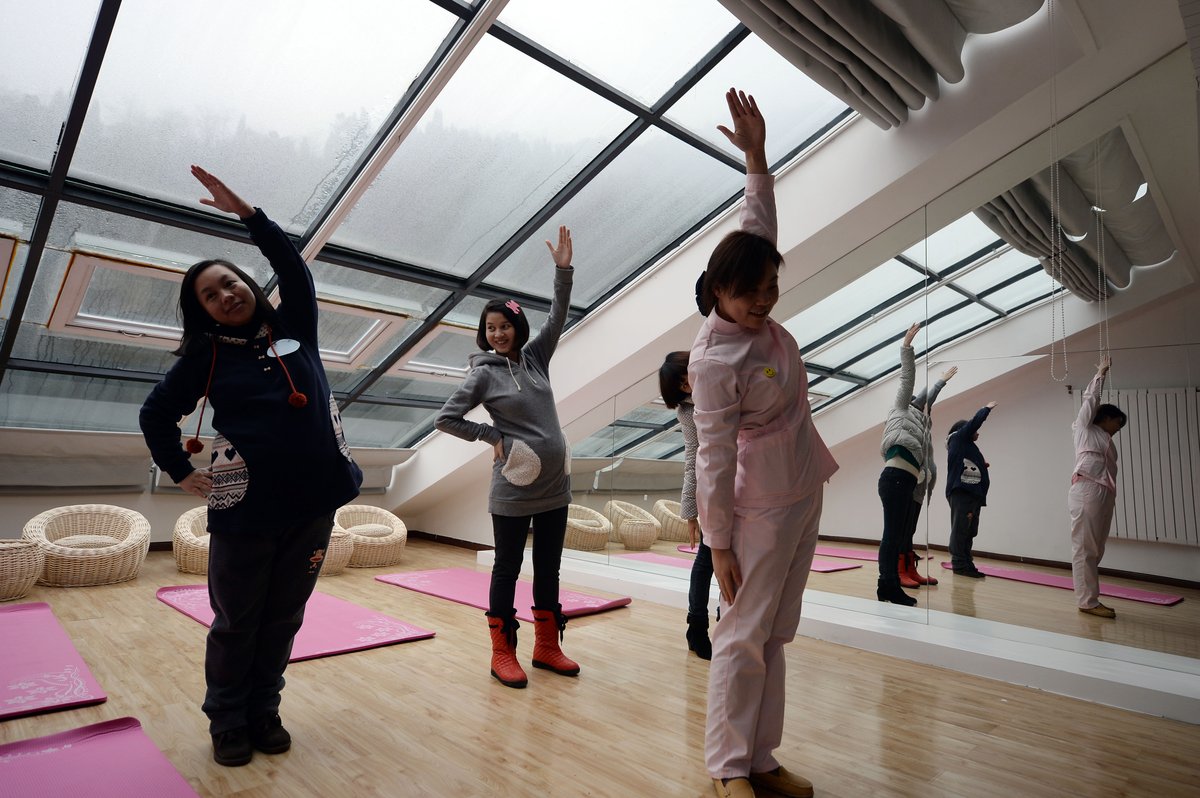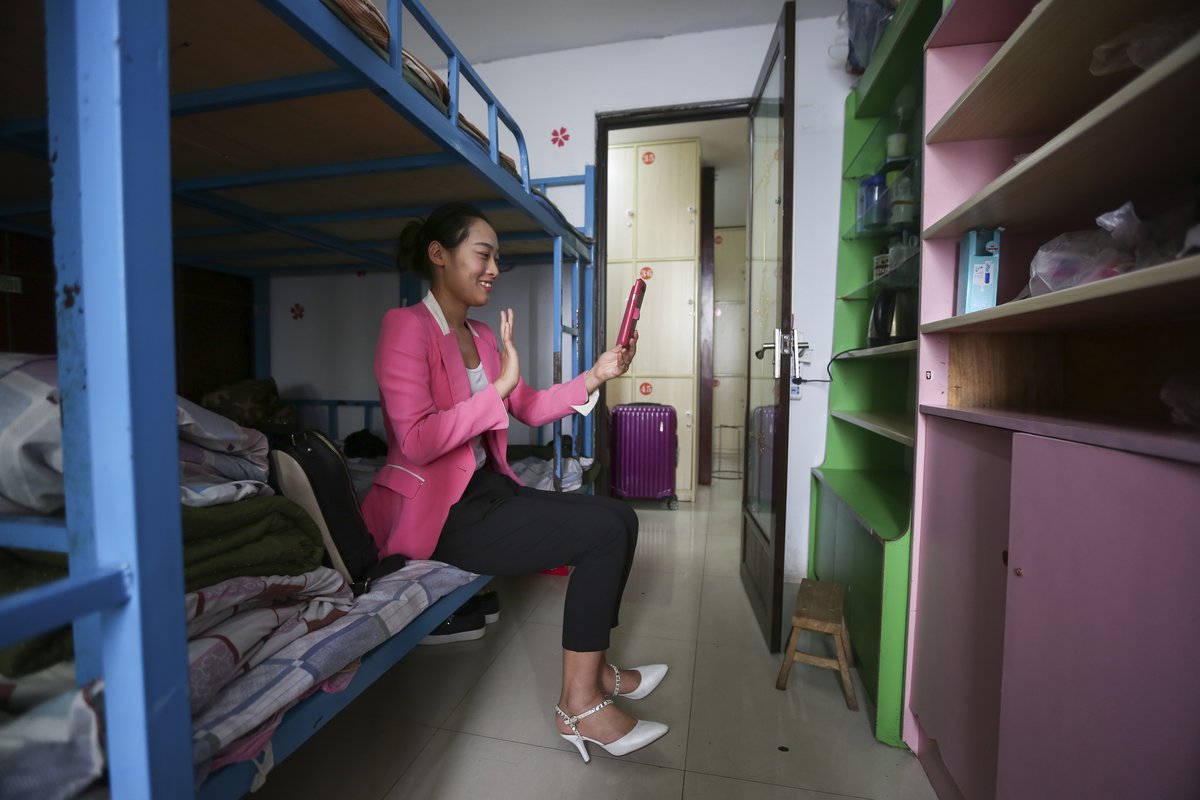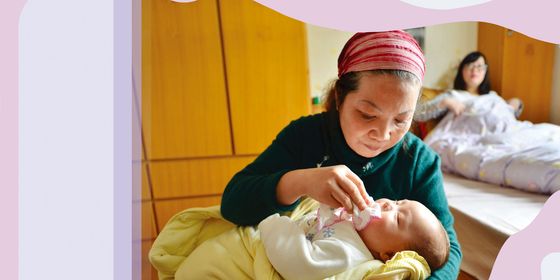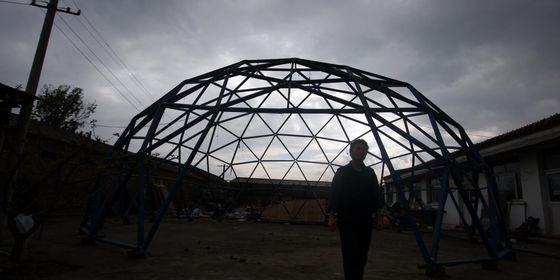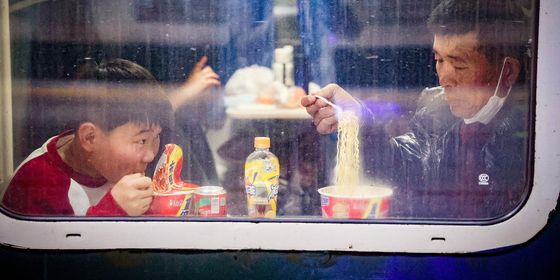“We have no hope of being seen as human”: a writer recalls her mother’s struggles as a ‘yuesao,’ a nanny specializing in newborn and new mother care
This is the story of my mother, Chen Wan, who worked for four years in the city as a “postpartum nanny.”
Chinese tradition dictates that women are in delicate health in the month immediately after they give birth. During this time, they are expected to stay confined to their home, and follow a strict regimen covering diet, hygiene, and rest in order to recuperate—a practice known as zuoyuezi (literally, “sitting the month”). Formerly, the task of taking care of new mothers and their infant during this critical month fell to other married women in their family, typically their own mother or mother-in-law. In the past decade, however, women who live in cities far away from their families, or who want more professionalized care than the older generation can provide, have begun hiring nannies specializing in postpartum care, also known as yuesao (月嫂).
The rise of the postpartum nursing sector once gave hope to many middle-aged migrant workers in the city: without needing much education, they could make a good living and support their families back home. But as the sector grew, so did the competition, and new standards introduced to address safety concerns in the industry inevitably saw older yuesao without high qualifications once again in the desperate conditions they started in.
It is hard for me to recount even a fraction of what this group of women experienced. I only wish to make their existence known, and for people to understand their incredible strength.
1 / 8
In late December 2012, Chen Wan traveled to the city alone.
It was her first time she had ever been to this city. As she followed the crowds out of the train station, the damp night breeze assaulting her with unfamiliar scents, her unease intensified. But her heavy responsibility to her family drove her to keep moving.
Chen Wan clenched a piece of paper holding the address that Ah Zhu had written out for her. Following the instructions, she got on a bus with her flimsy travel bag. It was already 7 p.m. when she arrived at the provincial women’s and children’s hospital. It took another half hour for Ah Zhu to come out and meet her.
Ah Zhu was a few years older than Chen Wan, and had six years’ experience as a “postpartum nanny.” Chen Wan’s landlord had introduced them about a month prior, and Chen Wan had arrived in the city to find employment in the same agency where Ah Zhu worked. But just yesterday, Ah Zhu had received an assignment: A mother had chosen a C-section due to the baby’s unusual positioning, and was in rough shape. Ah Zhu was preoccupied with her client, and couldn’t spare much time to show Chen Wan the ropes.
“I’ll take you to the company first and introduce you to the owner, Ms. Wang—then I’ll have to get back. She has a house in this city and is rarely around the office, but we’ve hired a few new people recently, so you came at the right time,” Ah Zhu said as she walked. Chen Wan followed Ah Zhu as she walked briskly, twisting and turning between old residential buildings. If her duffel bag had held more than a few changes of clothes, she wouldn’t have been able to keep up.
About 10 minutes later, a barracks-style building appeared before her. “The company is on the third floor,” said Ah Zhu. You can stay here tonight, and also when you’re between assignments, though it’s a bit crowded.”
Ah Zhu brought Chen Wan into a dark hallway. She clearly knew her way in the dark, swiftly ascending to the second floor before realizing that Chen Wan wasn’t keeping up. Ah Zhu finally stopped in front of an old iron door at the end of the narrow third-floor hallway. The hinges squealed as she opened the door, and everyone inside looked over as they walked in.
The “company headquarters” was an apartment with only two rooms and a common area. The common area was small and sparsely furnished. Across from the entrance, there was a pamphlet-strewn desk and a leather swivel chair. To the left of the door, there was an old gray couch with a small coffee table in front of it. There was nothing else in the room.
“Is Ms. Wang still in?” Ah Zhu asked.
“She’s in the office.” Several women chorused in a mix of regional dialects. Their faces looked sallow in the dim light.
After Ah Zhu walked in with Chen Wan, the room seemed even more cramped. The “office” door was right next to the couch. Ah Zhu knocked twice, and a female voice immediately responded from within.
“Ms. Wang, this is the Chen Wan I told you about earlier.” After the boss replied, Ah Zhu opened the door, saying, “You already know the details, and I’ll have to trouble you to take care of her. I have to rush back to the hospital now, but if you need to know anything more, don’t hesitate to ask her.”
A bed occupied a third of the office. Next to the bed was a desk and chair. If the desk hadn’t been piled with colorful papers, the space would have seemed more like a lounge.
Ms. Wang was a heavy woman in her early 50s. As she leaned back, her body filled most of the chair. To Chen Wan’s surprise, she only asked for some basic personal information—it wasn’t much of an interview.
“Go get your health certificate first thing tomorrow morning and come back for the training.” Ms. Wang returned Chen Wan’s ID to her. “Then you can pay the 200 yuan training fee.”
Ms. Wang never spent the night at the office. Before leaving, she addressed Chen Wan personally, “Remember to get your health certificate at the local disease prevention station. You don’t have to go to the hospital.”
2 / 8
There were a total of 11 yuesao in the common area. Four of them were new arrivals like Chen Wan, while the rest had just returned from various assignments. Chatting with them, Chen Wan discovered that she was actually the youngest, at the ripe old age of 43.
The nannies shared a bedroom next to the office. It was so small it could hold only one full-sized bed, leaving a narrow path for people to squeeze by. Chen Wan lay across the bed with 11 other people, her feet dangling off the side. It wasn’t comfortable, but she felt a minor ebb in unease that had accompanied her since her arrival.
When Chen Wan arrived at the clinic the next day, she saw that there were quite a few people waiting to get their health certificates. She caught snippets of their conversation, realizing that some were also yuesao.
“Is there some rule that yuesao have to get their health certificates from the clinic?” Chen Wan couldn’t help but ask.
The nannies looked at each other, falling silent. One of them finally spoke up, smiling. “There isn’t, but we do it to save money. The same inspection costs a lot more at the hospital.”
After she got back from the clinic, Chen Wan started her training. It wasn’t what she imagined. There was no specialized instructor; instead, Ms. Wang taught the lessons herself. The nannies who weren’t on assignment took turns being her teaching assistants.
Chen Wan later found out that Ms. Wang had once been a yuesao herself. A few years ago, she had recognized the growth potential in the field and staked out her territory before the market reached saturation. In the past couple years, companies with a foothold in the market were growing rapidly; there were new yuesao being hired nearly every month, and the orders came in flurries.
Ms. Wang lounged in the swivel chair behind the reception desk, holding a demonstration doll. She gave the new arrivals a quick rundown on caring for new mothers and newborns. But she spoke without order or structure, saying whatever came to her mind. When she finished, she had the veteran nannies next to her chime in with anything she missed.
Caring for new mothers and newborns involves a long list of tasks. With this unsystematic approach, the new nannies were lost.
—
The company received another batch of orders on the fifth day of training, but the experienced yuesao were all booked. Ms. Wang asked Chen Wan, “We have a new booking. You’ve been doing well in training. Can you take this one?”
“Am I ready to start working?” Although her “training” was over, Ms. Wang hadn’t tested them, and Chen Wan didn’t think she was ready to take the job yet.
“It’s just three days in the hospital caring for the mother and newborn. In this line of work, you need to get your experience on the job.” Ms. Wang spoke in her unhurried way.
Chen Wan thought this made sense. More pressingly, she needed the money. Her two kids were still in school, and she still didn’t know what the next month’s expenses were going to be. She nodded her assent. “When do I start?”
“Tomorrow. I’ll text you the client information and hospital address.” As she spoke, Ms. Wang pulled a folder from the pile of documents on the table. “This is your work experience certificate and health certificate.”
Chen Wan took the folder. She saw that her work certificate stated that she had been a yuesao since 2008. “Did they make a mistake?” Chen Wan sensed that something was off. A few days ago, one of the other nannies had told her, “The company was actually founded in 2009, but the owner tells people she started it in 2006 to make it sound more established. When clients ask, this is also what we tell them.”
As the other nanny told her this, she let out a self-deprecating laugh. “In any case, nobody has come ’round to check.”
All of the yuesao in the company came from similar circumstances: low education and high poverty. Some of them couldn’t even pass the health exam, coming here only after being rejected by other companies. It’s because of this that Ms. Wang hadn’t asked more questions about Chen Wan’s background.
“The company’s cut is too high. They take over half of my earnings from each assignment!” Another nanny, Sister Li, had grumbled to Chen Wan. “But there’s nothing for it, this is the only place that will take me.”
“If you encounter clients with stricter standards, the health certificate from the disease prevention station is no use,” Sister Wu added. “I had one of those families once. They wanted me to get a health certificate from the hospital before I started. I knew I wouldn’t pass, so I refused. They had me come back the next day anyway.”
Chen Wan still didn’t understand. “If you can’t pass, how do you get a certificate from the disease prevention station?”
“The station never asks what the health certificate is for, but the hospital does. When they hear that I’m a yuesao, they tell me they can’t pass me because I have antibodies for hepatitis B.” Sister Wu laughed bitterly. (Editor’s note: Hepatitis B is primarily transmitted through blood and other bodily fluids. The vast majority of infections are blood-borne.)
Chen Wan finally understood why the boss had her go straight to the disease prevention station for her certificate.
“There’s no mistake. Remember, if anyone asks, you already have almost five years of experience,” Ms. Wang instructed before she left for the job. “But this time around, it’s an old client, so I’ll let her know that you’re new.”
3 / 8
It was mid-January of 2013. A shower had just passed through, and the weather was cold and damp.
Chen Wan followed the client into an unfamiliar neighborhood. The streets were carpeted with the fallen leaves of subtropical evergreens, smacked down by the rain. She hadn’t expected to be forced into her role so quickly. Just the day before, after three days of nursing, she was preparing to leave the hospital when the new mother’s mother-in-law stopped her.
“Young Chen, why don’t you come stay with us for a bit? We’ll be troubling you to help us out for the next 20 days as well.”
Chen Wan didn’t understand at first, but she quickly realized that Ms. Wang had tricked her. This was never meant to be a three-day job: Her boss had signed a longer contract with the client behind her back.
Chen Wan didn’t let on that she hadn’t been informed. She was already on the horse, so she could only do her best to hang on.
—
Though it was freezing out, Chen Wan was still sweating heavily in the bathroom. She held the days-old baby, hyper-aware of its boneless softness. After taping up the baby’s navel, she hesitated. She never thought that the techniques she had learned in training would be so difficult to apply in practice.
“Sister Chen, don’t you know how to do it?” The recuperating mother interjected from one side.
Chen Wan didn’t know how to respond. Sweat was running down her temples, almost into her eyes, but she couldn’t make herself wipe it.
“Wipe off your brow, and let me show you.” The mother had already known that Chen Wan was a novice, but had still chosen her. Three days wasn’t a long time, but it was long enough to learn a person’s character. Although Chen Wan wasn’t experienced with caring for mothers and newborns, she was attentive, patient, and loving.
The mother took her daughter, cradling her body in her left hand and supporting the buttocks with her right. She gently placed her in the prepared basin.
“I’m sorry, I was just too nervous.” Chen Wan felt ashamed. “I’m really sorry to trouble you.”
“It’s alright, Sister Chen. Luckily this was my second child—I also hired a postpartum nanny with my first, and this time around I have more experience.” Having positioned the baby in the bath, the mother started washing her as she explained, “Watch the order I wash her in: First up, then down; first in, then out…”
Over the next few days, Chen Wan learned a lot from the mother: How to use a breast pump, soak the breasts, stimulate lactation, massage the breasts, prepare meals for the new mother’s diet, and more. It was as if the other woman was training her for a second time.
Many years later, whenever Chen Wan thought back to her first assignment, she felt deep gratitude for that mother—there was no way to express how much her kindness had encouraged and emboldened her.
—
Twenty days later, after Chen Wan finished her gig and returned to the company, she received her wages of 1,800 yuan. Ms. Wang had already taken her cut of 2,000 yuan. Taking a portion of her modest wages, Chen Wan enrolled herself in a proper yuesao course. She then sent the rest of the money to her children, and continued scrimping on her own living costs.
“Didn’t I already train you? What, was my training not good enough?” After learning that Chen Wan was taking another course, Ms. Wang’s tone chilled. “This client even said you did a good job, didn’t she? It would be a better use of your time to take a few more assignments and get in the practice that way.”
“If this client hadn’t been so kind, she would’ve fired me. It’s not that you didn’t teach me well, but that I’m slow and didn’t learn,” Chen Wan responded diplomatically. “Give me two weeks, and I’ll be able to take bigger assignments when it’s over. That way I’ll earn even more when the time comes.”
Ms. Wang scratched at her chin. Her half-closed eyes suddenly shot open. “I can’t stop you from wasting your own money, but aren’t you still missing one of the three certificates you need? There’s an entry-level certification test in four months. When your training is over, I want you to pick up a few assignments for me, and then go get that certificate!” (Editor’s note: The “three certificates” that yuesao need are an ID card, an up-to-date health certificate, and a mother-and-infant care certificate.)
4 / 8
That April, after Chen Wan finished her two-week formal training and took a few assignments, she passed her entry-level postpartum nanny certification with high marks. This is when her life as an on-call yuesao truly began.
When the year was almost up, Ms. Wang assigned her a particularly thorny contract. The client had dismissed two yuesao in turn—the first one after less than 10 days and the second before her first full day was up.
Upon talking to the previous nanny, Chen Wan learned that the mother had suffered a pubic-joint dislocation during delivery, and could barely walk. She had to spend over a month in a wheelchair. Meanwhile, her infant had a bad case of eczema. This all meant that the mother went around in a terrible temper.
“Do you dry the baby’s clothes in the dryer?” Chen Wan asked the mother on her first day. She had encountered this situation before.
“Yes, it’s been raining a lot, and my mother-in-law is concerned that damp clothes would be bad for the baby,” the mother said from her wheelchair.
Chen Wan continued, “Does this mean you’ve been putting clothes on the baby straight from the dryer?”
Seeing the mother nod, she explained, “Freshly dried clothes are not good for babies, because their skin is extremely sensitive—especially newborns. This kind of clothing can easily result in eczema.”
“Don’t worry, with me here, the eczema should clear up in less than two days,” Chen Wan comforted the mother.
She wasn’t exaggerating. Before two days were up, the baby’s eczema was almost gone. The mother and her family were overjoyed, repeatedly praising Chen Wan’s experience. “Not like the other two, who were like amateurs. Neither of them knew what to do.”
Hearing this praise, Chen Wan couldn’t help but laugh bitterly to herself. She hadn’t forgotten how desperate she’d been a year ago. If it hadn’t been the kindness of that first family, she might not have made it till now.
But the goodwill didn’t last long. Soon, the family was treating her like round-the-clock help.
“Given how I spent money to hire you, shouldn’t you be available around the clock?” Two months ago, one of Chen Wan’s clients had said this to her. And although this mother never said as much, she displayed the same attitude in her behavior.
The mother ate seven meals a day. For each meal, she needed a change of clothes and two towels. Adding in the baby’s clothes, Chen Wan had to wash 12 sets of clothing a day. “Make sure to wash them by hand, it’s good material,” the mother admonished.
Every afternoon, after she finished feeding the baby and lulling her to sleep, it was supposed to be Chen Wan’s turn to rest. But without fail, as soon as she came out of the nursery, the mother would yell for her. “Sister Chen, come give me a massage, my milk is coming in!” But when Chen Wan went to massage her, there was never much milk.
Chen Wan would go to bed at 2 a.m. and wake up at 4 a.m. to prepare breakfast. She continuously tended to the mother, who weighed 75 kilograms and could barely leave her wheelchair. After 10 days of this, Chen Wan finally cracked. “Are you unsatisfied with my work, or with me as a person? If I don’t rest, then I can’t do my best caring for you and your baby. If you don’t feel I’m good enough, I can help you find another yuesao.”
“No,” the mother replied curtly. “This is just my personality, sister, don’t blame me. I’m in my 30s, and I’ve had two kids.” She confessed from her wheelchair, “I may be depressed.”
In the following days, the mother’s attitude finally improved. She stopped making Chen Wan wash the clothing by hand, and she stopped looking for excuses to keep her from resting at lunch. Sometimes, she even talked to Chen Wan about her postpartum depression.
“Why don’t you stay another two weeks? When you leave, I won’t have anyone to talk to,” the mother cried to her when the month was almost up.
“I would also like to stay longer with you, but the contract period has already been set. The next assignment starts right after this one.” Chen Wan comforted her, “You’ll have your baby to look after. You have to open your heart—having a child is a joy in itself.”
The mother squeezed Chen Wan’s hand and then wiped her tears. She started laughing, “You’re right, I couldn’t be more blessed to have this child.”
Without meaning to, Chen Wan asked her boss why she, a rookie nanny with less than a year’s experience, was assigned to a mother who had postpartum depression. Her boss’s response caught her by surprise: “Every time you come back from an assignment, I call the clients to check in with them. And just as I expected, they always think you’ve done a good job.”
This is how Chen Wan learned that Ms. Wang kept tabs on her every move.
5 / 8
In fall of 2014, Chen Wan took the intermediate postpartum nursing exam, but she walked away with an advanced certificate. When she asked Ms. Wang, she learned the truth: “I have some contacts there—I just talk to them, and they have ways of getting you an advanced certificate.” Her boss adopted a conspiratorial tone: “But this isn’t a certification that just anyone could get.”
Just like that, Chen Wan became one of the company’s senior yuesao. Her pay went up, the assignments got thornier, and Ms. Wang’s cut also increased.
In April 2015, Ms. Wang accepted another difficult contract for Chen Wan. The mother was the owner of a fashion chain, and she had already dismissed a lactation consultant, a nurse, a doctor, and two yuesao in quick succession.
When Chen Wan arrived at her client’s house, she encountered a scene of total chaos: The whole family crowded around a wailing baby, trying to comfort him to no avail. Chen Wan took the baby and removed his diapers. Just as she expected, the baby’s bottom was a shocking crimson—he had a diaper rash. It was a severe case, already bleeding. She looked again, and saw that the baby’s face was dark and his body wrinkled. He clearly had been going hungry for quite some time.
“Has it been a while since the baby last nursed?” Chen Wan immediately asked.
“He has only nursed four times since he was born,” the mother replied anxiously. “I just can’t get any milk in. Every time I try it’s like he’s suffocating, and his whole face turns purple.”
“For now, the important thing is getting the baby fed. After that, I can deal with the diaper rash.” Chen Wan directed the mother into the bedroom. Sitting in front of the bed, she instructed, “First lie down on your side.”
“Does it have to be lying down? How does that work? Is that right?” The mother hesitated to comply.
“You can trust me. Come, lie down.”
After the mother lay down, still skeptical, Chen Wan put the baby gently next to the mother. She pressed his head against her breast, and had him latch on. Not long after, the baby started to suckle.
“He’s really nursing!” The mother exclaimed in surprise. The family members who had been hovering outside the door all flocked into the room to look. They were beside themselves with joy.
“Sister, you’re a hero to the whole family! We tried with so many people, and none of them could get the baby to nurse—and you did it right away!” The mother finished breastfeeding, her face glowing with admiration. “The previous nanny saw the blood when she went to change the baby’s diaper and came running to me right away. She said she couldn’t do the job because she didn’t know how to deal with it.”
The mother was an entertaining conversationalist. Over the course of the month, she told Chen Wan her life story. “I was originally from another city, and after I graduated from university I came here to work as an accountant. I made good money for a few years, and after that I wanted to start my own business, so I opened a Western restaurant.” She suddenly turned to Chen Wan. “Sister, you’ve had milk tea before, yes? Do you like it?”
“I haven’t,” Chen Wan replied honestly.
“Then don’t start! Do you know how much a cup of milk tea costs? A regular cup is already over 10 yuan, but a bottle of our concentrate is also about 10 yuan—and one bottle makes over 100 cups. I ran the restaurant for four years, really raking it in, but I didn’t feel good about it. I couldn’t keep making money so dishonestly, and I didn’t want bad karma for my child, so I turned the restaurant over to someone else and opened a clothing store…”
Chen Wan thought that when she got back home, she would have to tell her kids to drink less milk tea.
—
The day the baby turned one month old, the mother asked Chen Wan if she was a Buddhist.
“I am.” Chen Wan felt that specific beliefs weren’t as important as having something to believe in. That way, life wasn’t so hard to bear.
“Then let’s go to the shrine together and light some incense for the baby.”
That day, the two of them braved the rain to go to a distant temple on the flank of a fog-shrouded mountain. After burning the incense, Chen Wan saw peacocks on the temple grounds. To this day, she still remembers her surprise and delight upon seeing them.
“Young sister, thank you for bringing me here,” Chen Wan thanked the mother as they made their way back.
6 / 8
During the summer of 2015, Chen Wan bumped into another woman as she walked out of the maternity ward of one of the city’s hospitals. “Are you also a yuesao?” she asked.
Through their brief conversation, Chen Wan learned that this woman, Zhao Hua, was actually from her hometown. She became a yuesao in 2003, and had been in the field for 12 years already.
The two of them bonded over their similarities, quickly becoming friends. Chen Wan later learned that Zhao Hua took 12 contracts a year, working full-time without rest. Her husband was a gambler who owed 140,000 yuan in debt, and her son had been detained for helping his boss evade taxes. The case was still working its way through the legal system. On top of paying her husband’s debt, she had to hire lawyers for her son. Like a top that never stopped, she spun on for year after year, unable to rest.
“Ah Wan, every time I hire a lawyer it costs 8,000 yuan, but they just go up and say a few sentences,” Zhao Hua complained over the phone. “It’s happened several times now, and we never see any progress. But I don’t know what else I could do for him.”
A choked sob came from the other end of the line. “I used to fear that he’d be sentenced to prison, but now I hope he will. Then at least I’ll know how many years I need to wait.” Zhao Hua’s voice dropped, like she was suppressing something. “If I’m waiting for him to get out, I’ll have something to hope for.”
Another time, she said with some anguish, “In this line of work, we have no hope of being seen as human.”
It turns out that Zhao Hua had run into a particular brand of suspicious client. During the contract period, the mother-in-law watched her like a hawk; before Zhao Hua left, the mother-in-law demanded to inspect her luggage. “How else would I know if you slipped something of ours in there?”
“Don’t dwell on this kind of thing. If we did, we wouldn’t be able to make it through a single day,” Chen Wan replied, helpless. It had also happened to her many times.
“It’s true, I can’t dwell on it. Sometimes when I think about all this I can’t help but cry, but at my ripe old age, I’d get laughed at for crying.” Zhao Hua started laughing. “Chen Wan, you’ll be alright. Hang in there for another few years, then you can live a life of comfort after your kids graduate and start working.”
7 / 8
When Chen Wan met Zhao Hua, her daughter was already in her final year of high school. That year, Chen Wan happened to finish an assignment just as the National Day holiday was starting. She worried that her daughter was under too much pressure at school, so she decided to bring the girl to the city to enjoy herself for a few days.
As Chen Wan walked with her daughter between the aging residential buildings, she suddenly recalled the night she first came here.
“Why don’t I take you to the hotel near the company headquarters? There’ll be a lot of nannies finishing their assignments around now, and there might not be space for you at the company. It’s a rare chance for you to come out here; you should relax and catch up on sleep.”
“No need for that, Mom. I came here to spend time with you anyway,” her daughter replied. “If you want me to go stay on my own in the hotel, there’s no way I’m saying yes.”
Sure enough, when Chen Wan opened the old metal door, she saw that the reception area was already crammed with people. Ms. Wang was sitting on the swivel chair, laughing and talking with a few old-timers. When Chen Wan came in with her daughter, they quickly redirected their attention.
“Young Chen, who’s this? Boss, you’ve got another new arrival!” Sister Wu said in her Sichuan accent.
“Coming to be a nanny at such a young age, looks like there’s competition for us grannies’ rice...” A few of the nannies on the sofa began chattering like they’d discovered something new.
“Young Chen, is this your daughter?” As soon Ms. Wang spoke, everyone fell quiet.
“Yes, I brought her here for sightseeing for a few days.”
“Is she on holiday from school? You ought to make the best of it, take her and get something good to eat.” Sister Li cut in.
Chen Wan felt a flutter of nerves as she entered the room on the left. She didn’t want her daughter to see the conditions she’d been sleeping in this whole time.
“Mom, will I also be sleeping here tonight?”
“Yes, there’s only two rooms. The other one is the boss’s office.” When Chen Wan saw her daughter look at the little bed and fall quiet, she hurried to explain, “There usually aren’t so many people here, it’s just that a lot of nannies are in between gigs these past few days, so it’s more crowded. Most of the time, I’m out on assignment, so I rarely sleep here. Don’t you worry about me.”
That night, Chen Wan had her daughter sleep in the corner, shielding her with her body. She decided that no matter how much the girl protested, she would make her sleep at a hotel the following night.
Just then, Sister Li spoke from next to them. “Young Chen, my son ought to be the same age as your daughter now. I haven’t seen him in almost four years.”
“I also haven’t seen my daughter in a long time. I don’t know if she’s doing well in school.” Another nanny piped up.
“It seems like you can make video calls on the phone now—too bad I only know how to use the landline.”
“You need a smartphone for video calls, your phone can only make regular calls!”
Chen Wan didn’t think that the conversation would go here. She hoped that her daughter wouldn’t worry after hearing all this. She sneaked a peek at the girl’s sleeping face and sighed in relief.
“When my son got married last year, I couldn’t go because I was on a job. If his wife ever has a child, I don’t know if I’ll be able to help out…we spend year after year caring for other people’s children, but we don’t even know if our own kids are getting enough to eat,” another nanny was saying.
“Young Chen, you have it pretty good, being close enough to home for you to go back a couple times a year. And you can even bring your daughter here. Now look at me, it’s been three years since I came here from Sichuan, and I haven’t been back even once,” said Sister Li. “I’m scared that if I go back, I won’t be able to make myself return, haha.”
Even though Sister Li was laughing, she couldn’t hide her sadness. “One time I wanted to write a letter to my daughter—I even went out and bought a pen and paper. But when I sat down to write I realized I only knew how to write her name…”
“It’s useless to keep thinking like this! Your kids will only have books to read if you buckle down and make money. Do you want her to be like you, not even able to write a letter?” another nanny scolded her.
“You don’t mince words, do you? But you’re not wrong, haha...”
The conversation continued into the night. What Chen Wan didn’t realize, as she let out the breath she was holding, is that tears were escaping her daughter’s tightly shut eyes.
8 / 8
In 2016, Chen Wan received a text from Zhao Hua on the eve of the Lunar New Year. It was a photo of a small bowl of boiled mustard greens and a bowl of rice, followed by a message: “I’ve been eating this for almost a month, and tonight I’m having it again.”
Zhao Hua had taken a holiday assignment this time around. The family ate all their meals separately from Zhao Hua, and would prepare a bowl of boiled mustard greens for her—even during the biggest holiday of the year. “My stomach started hurting after only a couple days.”
“You should stop working for them. Your health is important, and there will always be another opportunity to make money.” Chen Wan pleaded with her, even though she knew pleading was no use.
Sure enough, Zhao Hua refused. “I’ll stick it out for another few days. The New Year pay is better, and you know I can’t spare the money.”
In fact, even as she was trying to convince Zhao Hua, Chen Wan was fighting stomach pains of her own. She had already been eating boiled fish rolls for half a month at her job in another city.
This client’s family came from several generations of teachers. During the mother’s postpartum confinement, her mother-in-law came for a visit from her hometown with some local specialties—fish rolls.
“I haven’t had to cook most of my life, so don’t hold it against me if my cooking’s no good,” she said. Chen Wan thought she was joking, but after a single meal, she realized it was the naked truth. Whether she was cooking meat or vegetables, the mother-in-law would pour some oil into the pot, then add boiling water to cook the ingredients. The fish rolls were no exception.
You can imagine how this tasted, but the mother-in-law insisted that this was the healthiest way of eating.
By the time Chen Wan finished her contract a month later, she was a whole size thinner.
—
After the Lunar New Year, Chen Wan left Ms. Wang’s company.
The company had seen a lot of turnover over the past few years. Most of the remaining nannies were ones who were unable to get their health certificate—there was no other reason to keep enduring Ms. Wang’s exploitation. The loss of many senior nannies meant that the company’s reputation took a beating. Before long, they were on the brink of bankruptcy.
“Ms. Wang, I’d like to leave the company.” Chen Wan had her doubts when asking to resign. She knew that if Ms. Wang hadn’t helped her over the years, she wouldn’t have been able to build her good reputation. Even though she’d been pushed to her breaking point, she still felt a sense of gratitude.
“I knew you’d eventually leave,” said Ms. Wang, leaning back in her office chair. “In fact, I’m quite happy to see you all leave one by one. You may not believe me, but watching you progress from rank novices to where you are now, I do feel a sense of fulfillment.”
“Now that you have your reputation, you’ll naturally be able to find your own clients. This is the fruit of your own ability,” Ms. Wang said reasonably. “Your departure is truly a blow to the company. But I also haven’t forgotten why you came in the first place, so I won’t hold you any longer.”
—
As she aged, Chen Wan felt less and less capable. Years of nannying hadn’t improved the cervical spondylosis she’d acquired at her previous factory job; instead, it gave her lumbar spondylosis and arthritis as well.
And over the past few years, as yuesao gained recognition as a vocation and new blood entered the field, there were now new regulations as well. The old guard was being made obsolete.
“You know how to type on your cell phone, but you can’t write by hand?” The young HR representative at another postpartum nursing agency asked.
“No, I really don’t know how to write.” Seeing her interviewer hand over a thick “Postpartum Care Log,” Chen Wan was at a loss. She thought it was enough to take good care of the mother and baby; why did she have to write everything she did in a book as well? This was beyond her. Even if she could write, it would take a long time for her to write the two pages of reports the company asked for each day.
“Sister, your training is outdated. It’s time to standardize!” The young woman emphasized each syllable in the last word.
There were many yuesao facing the same situation as Chen Wan. They were older, with minimal education, but they had years of accumulated experience. Somehow, this had become “outdated.”
“My son hasn’t married yet, and we haven’t even been able to buy a house.” Sister Li, who had been dismissed from the same company, didn’t hold back her bitterness.
Epilogue
I still remember going to my mother’s agency, that holiday when I was in my last year of high school. The company was still bustling back then. I remember squeezing into the bed in that common bedroom; I can still hear the bitter laughter of that woman from Sichuan who hadn’t seen her daughter in years.
Later on, hearing my mother tell stories about these nannies, I realized that they only acted like this when they were at the headquarters. However shabby and crowded, it was the only place where they didn’t have to answer to anyone else, where they could drop their masks
I once bumped into Zhao Hua, who clasped my hand in excitement and told me to take good care of my mother. She laughed as she said this, but her eyes were sad. I imagined that she must have been thinking about her son, who was still in prison.
In 2019, after I graduated from university and found a job, my mother finally left the profession once and for all. I don’t know if the other yuesao I met are still working under arduous conditions, or whether they, like Zhao Hua, have left the profession to take hourly jobs elsewhere.
I later found the “Postpartum Care Log” somewhere in our house. When I opened that thick notebook, there were only two crooked characters inside: my mother’s name.





